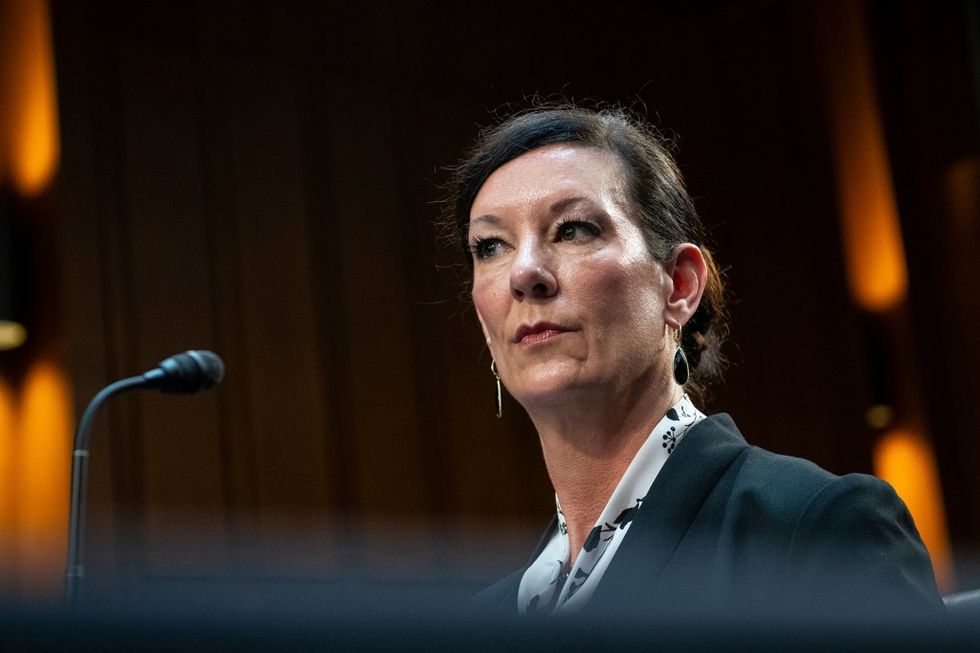This story was produced in partnership with The Garrison Project, an independent, nonpartisan organization addressing the crisis of mass incarceration and policing.
Jennifer was freezing. She was dressed in a brown T-shirt and scrubs. Chains, wrapped twice around her waist, pinched her belly. Handcuffs dug in tightly on her wrists, leaving purple bruises. She was tired. She was hungry. And she was petrified because she had no idea where she was going. All she knew was that the prison where she’d lived for years was shutting down and she was on a bus headed to a far-away facility. Other women on the bus were panicking too. One woman defecated herself and pleaded with the correctional officers to stop the bus so she could change. Other women were menstruating and bleeding through their pants.
Jennifer and others begged the bus driver to turn up the heat and the music down.
He said no.
“I have two rules,” Jennifer recalled him saying. “You don’t mess with my playlist or with my heating and cooling.”
The driver then blasted the air conditioning for the next 12 hours, from Atlanta to the Federal Detention Center in Miami, a high-rise administrative detention center 2,000 miles away from her family in Arizona.
Seemingly to torment the women, the driver played the children’s song “The Wheels on the Bus” over and over again, switching it only to blare hip-hop songs with sexually explicit lyrics.
He only turned off the AC and switched to gospel music shortly before pulling up to FDC Miami.
“He called us whiny bitches,” Jennifer said. “He made us feel like closing FCI Dublin was our fault.”
Jennifer — who asked to only be identified by a pseudonym because she fears retaliation from the Federal Bureau of Prisons for speaking to a reporter — is one of 605 women who were housed at the Federal Correctional Institute in Dublin, California. FCI Dublin is a low-security, all-women’s prison — actors Felicity Huffman and Lori Loughlin served their sentences there in their college admissions fraud cases — about a 45-minute drive east of San Francisco.
It’s the prison where eight correctional officers, including former Warden Ray J. Garcia and the prison’s chaplain, were charged in federal court for sexually abusing dozens of incarcerated women. It’s the highest number of correctional officers to be charged with sex crimes in any federal prison in the U.S. Sexual abuse was so pervasive at FCI Dublin that it earned the nickname “rape club.”
Garcia is the first warden in BOP history to be sent to prison on a sex crime. Garcia retired from his post in 2021 after the FBI discovered nude photographs of incarcerated women on his phone. In March 2023, he was sentenced to nearly six years in federal prison.
Seven of the officers have either been convicted or sentenced to prison themselves. The eighth, Darrell Smith, was charged with 12 counts of sexual abuse of a ward, aggravated sexual abuse and abusive sexual contact. Smith was nicknamed “Dirty Dick” by women at FCI Dublin, and he allegedly sexually abused three women from 2019 to 2021. The women said Smith engaged in particularly bizarre conduct, even for FCI Dublin: He would often eat bananas while staring at them coming out of the shower. Smith has pleaded not guilty to the charges. His case is headed to trial in March 2025.
In April, Smith’s attorneys withdrew from the case because he couldn’t afford to pay them.
“The sexual abuse scandal at FCI Dublin was horrific and rampant,” said Shanna Rifkin, deputy general counsel at Families Against Mandatory Minimums, a national group whose mission is to create a more fair and effective justice system. “But they are the canary in the coal mine. They’re only unique because people started to pay attention. But sexual abuse is happening in prisons all across the country. This is not just a Dublin-specific problem.”
Earlier this year, BOP administrators provided testimony in a federal courtroom vowing that they had stamped out the sexual abuse crisis at FCI Dublin thanks to the cases brought against the officers in 2022 and 2023. In late January, attorneys for the BOP told 60 Minutes that “no threat remains” at FCI Dublin. “We’ve done a tremendous job in the last year rebuilding that culture and creating — an institution that is more safe, where individuals feel comfortable coming forward and reporting claims,” BOP Director Colette Peters said.
On March 11, FBI agents conducted a surprise raid on FCI Dublin, and replaced Warden Art Dulgov with BOP veteran Nancy McKinney. And all the administrators who had testified before the federal judge were removed, too, for reasons that have still not been made public. No charges have come yet from the FBI raid.

On March 15, U.S. District Court Judge Yvonne Gonzalez Rogers said a “special master” must oversee reforms at FCI Dublin and report to her; it was the first time in BOP history that a prison had been placed under such oversight. FCI Dublin “is a dysfunctional mess,” the judge wrote. “The situation can no longer be tolerated. The facility is in dire need of immediate change.” Gonzalez Rogers slammed the BOP for proceeding “sluggishly with intentional disregard of the inmates’ constitutional rights despite being fully apprised of the situation for years.”
But on April 15, Peters made a sudden announcement: the BOP was shutting down FCI Dublin.
Peters said in an email to reporters that the BOP has “taken unprecedented steps and provided a tremendous amount of resources to address culture, recruitment and retention, aging infrastructure — and most critical — employee misconduct.”
But, Peters added: “Despite these steps and resources, we have determined that FCI Dublin is not meeting expected standards and that the best course of action is to close the facility.”
Warden McKinney wrote in court documents that the closure of the prison — which also has long-standing asbestos and mold problems — was contemplated for a long time.
The move to shutter the open-campus facility surprised incarcerated women and their attorneys, who in August 2023 filed a class action lawsuit alleging that people incarcerated there faced continuing harm as a result of the failure to protect them from sexual abuse by staff. That case is now scheduled for trial in June 2025.
In March, separate federal lawsuits on behalf of 12 incarcerated women were filed against FCI Dublin by two legal nonprofits and a law firm alleging a “pattern that has emerged across myriad investigations, criminal prosecutions, and lawsuits: sexual abuse at FCI Dublin has been enabled by a system where coercion is the norm, outside scrutiny is rare, and officers protect one another from accountability at all cost.”
Other women and law firms have also sued FCI Dublin and the BOP over sexual crimes committed at the prison. To date, the number of lawsuits stands at 63, and up to 100 are expected.
After FCI Dublin’s closure in mid-April, hundreds of women like Jennifer were loaded on buses, some in the middle of the night, taken to prisons in West Virginia, Texas, Kentucky, Philadelphia, Seattle, Illinois, Minnesota, and Florida. They were moved out in 16 days.
In a memo, Peters commended her staff’s “tireless efforts in facilitating the successful transition” of the women to other prisons, adding that she expected “that the women’s needs [would be] addressed with compassion and respect.”
Jennifer said she certainly didn’t feel she was treated with compassion and respect.
“It was hasty and cruel,” she said in a series of recent phone calls from FDC Miami, where she said she has no access to video visits and no access to the outdoors or sunshine.
Incarcerated women like Jennifer, and even U.S. congressional leaders, have said FCI Dublin’s closure — and prisoners’ dispersal to far-flung parts of the country — smacks of BOP retaliation.
In late April, five U.S. senators — California’s two Democratic senators, Alex Padilla and Laphonza Butler, as well as Cory Booker (D-N.J.), Jon Ossoff (D-Ga.) and Richard Durbin (D-Ill.) — demanded that BOP provide them with information on how the agency prepared to close FCI Dublin.
“Given the exigency of this unfolding crisis,” they wrote, “we request immediate action and an update today on efforts the Bureau is taking to ensure that those in your custody who are affected by the closure of FCI Dublin are afforded the care, dignity, and respect to which they are entitled.”
The BOP has not responded to that request.
“It’s definitely worse here,” Jennifer said. “They felt threatened by us. They didn’t want anyone to have oversight over us. And they proved it. They moved us all away.”
OVER THE LAST TWO YEARS, I have been covering the sex crimes, retaliation against those who have spoken out about the abuse, and the legal battles at FCI Dublin for a Fox-owned TV station, KTVU, in Oakland, California.
In 2022, the Department of Justice began charging individual correctional officers with the federal crime “sexual abuse of a ward” — it’s illegal for a person in authority, like a correctional officer, to have any type of sexual contact with a person in their custody.
Many officers told the incarcerated women that they loved them and would marry them. Some bought them jewelry and bought them snacks in the commissary. Oftentimes, they had sexual relations throughout the FCI Dublin campus.
But there is no real consent in this dynamic, which is why any type of sexual contact between a correctional officer and someone behind bars is illegal.
On Jan. 21, 2022, I published my first story about FCI Dublin.
About two weeks later, a woman named Andrea Reyes contacted me. She had been a victim of Ross Klinger, a correctional officer in the recycling unit. She could prove it to me. And she was willing to speak publicly about her experience.
She told me that not only did she have sex with Klinger, he also examined her mental health files at the prison to prey on her vulnerabilities and use her childhood triggers to manipulate her.
Klinger saw that Reyes has bipolar and borderline personality disorders, PTSD, and other mental health issues that she’s been dealing with since high school. Then, she said, he used that information to manipulate her.
“He’s like, ‘We have access to your files,’” Reyes recounted him saying. “So he knew my whole life. He knew where I was vulnerable and what to use against me. And I don’t feel it’s OK for other women to go through it.”
She said she knows he went through her file because “he showed it to me himself.”
Reyes told me that what hurt her the most is that she thought Klinger actually cared about her. Then she caught him having sex with another woman at the prison. She felt betrayed and angry.
“I feel like he literally would pick the ones he felt were weak,” she said at the time. “I believed him. I was alone and I was vulnerable.”
Reyes was brave, and the first woman at FCI Dublin to offer a rare glimpse of the sex acts happening behind closed doors — as well as in the chaplain’s office, on bunk beds, and in bathroom stalls.
Reyes received some blowback from other women at FCI Dublin. A handful called her a snitch. But her public admission of what happened to her opened the floodgates. Other incarcerated women began finding me and sharing their stories of sexual abuse. They also detailed the punishment they suffered if they spoke up about this abuse.
In February 2022, Klinger entered a guilty plea in federal court to three counts of sexual abuse of a ward. He was the first officer from FCI Dublin to do so. In January, Klinger was sentenced to one year of home detention because he became a government informant to help bring down other officers, including Garcia, the former warden.

To date, I’ve spoken with at least 100 women about their experiences inside FCI Dublin and now, at other prisons they’ve been moved to across the country by the BOP.
A few women said they were doing OK, and in fact, the medical care was better at their new facilities.
But dozens of women have written, emailed, called and had their relatives contact me at KTVU to say that they are being retaliated against and mocked for being from FCI Dublin.
Tyra Deja Mabon was transferred to FDC SeaTac in Seattle. She said at the administrative facility, FCI Dublin transfers haven’t been given soap, pillows, clean laundry, or cleaning supplies.
“They keep locking us in all the time like we are a threat,” Mabon wrote in an email.
She said that at least on one occasion, FCI Dublin women were given rice and beans for dinner, while the other 800 incarcerated people were served chicken patties.
“Staff said that they ran out of food for us Dublin inmates,” she wrote. “The entire SeaTac staff has been very hostile and aggressive and mean.”
Mabon said their poor treatment stems from speaking out against sexual abuse at FCI Dublin.
“They are giving us mass retaliation and bullying us,” Mabon wrote. “The whole Dublin FCI population is receiving backlash. They’re making mockery, saying if us women would have shut our mouths about the PREA [Prison Rape Elimination Act, a 2003 federal law that aims to end sexual misconduct in correctional facilities] etc., that we wouldn’t be getting shipped and the FCI Dublin was closed down because of us.”
The BOP responded via email that the “safe and compassionate transition of the women from FCI Dublin is a top priority of the Federal Bureau of Prisons.”
Spokesman Scott Taylor added that when retaliation was alleged, the BOP forwarded the allegations to the respective executive employees of the various facilities and the Office of Internal Affairs for “further review and action, if warranted.”
Rifkin, the attorney from Families Against Mandatory Minimums, said she and others are worried about how the FCI Dublin transfers are faring.
“It sends a pretty bad message to other incarcerated women: ‘Don’t report, because look at what happens,’” Rifkin said. “This will chill others coming forward. I’m really concerned about their safety.”
THE BOP IS a small part of the carceral system in the United States — it holds about 208,000 behind bars, while there are more than 1 million people in state prisons. Yet it is outsized in its troubles. The 60 Minutes piece in January described the BOP as “a federal agency plagued by understaffing, abuse, disrepair.” Its supermax facility in Florence, Colorado — which holds 9/11 planner Zacarias Moussaoui and Boston bomber Dzhokhar Tsarnaev among others — has been hit with waves of lawsuits over conditions of confinement. “Prisoners interminably wail, scream, and bang on the walls of their cells,” according to one lawsuit. “Some mutilate their bodies with razors, shards of glass, writing utensils, and whatever other objects they can obtain.”
In 2018, mafioso James “Whitey” Bulger — the inspiration for Jack Nicholson’s character in the 2006 Martin Scorsese film The Departed — was brutally murdered by inmates at a high-security prison in Virginia, just hours after the BOP transferred him from a relatively safe, low-security facility in Florida. A Justice Department report identified numerous BOP failures in the transfer. In May, three inmates pleaded guilty in Bulger’s killing.
In 2021, the BOP shut down the Metropolitan Correctional Center in Manhattan after a high-profile series of scandals — including El Chapo’s claim that he experienced “physical, emotional and mental torture” there, and the reported suicide of Jeffrey Epstein in 2019. A blistering 2023 Justice Department report found that “staff failed to ensure that the institution’s security camera system was fully functional resulting in limited recorded video evidence” of Epstein’s death, and that staff in the Special Housing Unit where he was housed failed to conduct rounds and inmate counts, search cells, and ensure adequate supervision of the unit.
In August 2022, Attorney General Merrick Garland swore in Peters as the new BOP director. Peters had previously run the Oregon Department of Corrections for ten years, and was known for developing the “Oregon Way” of running prisons, where she promised to transform “environments inside correctional facilities to be more normal and humane.” She was the first woman to serve as director of the Oregon corrections department, and she promised to reform the violent and scandal-plagued BOP. FCI Dublin was high on the list for reform under Peters. Peters issued a statement to KTVU that one of her first steps as director was to undertake a “holistic culture assessment” of the facility to figure out what was happening there and to make people comfortable enough to speak up about sexual assaults and illegal sexual relationships.
In September 2022, Peters told Ossoff and the Senate Judiciary Committee that she had already made a few reforms, including making sure staff was trained in gender responsiveness and trauma-informed care, reorganizing the Internal Affairs division at the prisons, hiring 40 more employees and investigators to clear the backlog of complaints, and redirecting those allegations straight to the BOP.
“I want no surprises,” Peters told the senators. “Headquarters needs to know when things aren’t working.”

But that December, Ossoff released the results of his investigation into sexual abuse of women in the BOP, finding that its employees sexually abused female prisoners in at least two-thirds of federal prisons that have held women over the past decade. He also found that BOP has failed to prevent, detect, and stop the abuse. “Let me be absolutely clear: This situation is intolerable,” Ossoff said. “Sexual abuse of inmates is a gross abuse of human and Constitutional rights and cannot be tolerated by the United States Congress. It is cruel and unusual punishment that violates the Eighth Amendment to the United States Constitution, and basic standards of human decency.”
In 2023, Ossoff and Rep. Lucy McBath (D-Ga.) introduced the bipartisan Federal Prison Oversight Act, which would establish new, independent oversight of the BOP. In April, the bill passed out of the U.S. House Committee on Oversight and Reform. The House overwhelmingly passed the bill on May 21. In a statement after the bill’s passage, Ossoff said, “I now urge Senate leadership to bring our bipartisan bill for a vote and send it to the President’s desk.”
“For years, I’ve led vigorous oversight of the Federal Bureau of Prisons, a diseased bureaucracy that continues to endanger the health and safety of inmates, staff, and communities across the country,” Ossoff told Rolling Stone. “This is yet another reason why it’s imperative we pass my bipartisan Federal Prison Oversight Act to strengthen oversight and hold them accountable to improve conditions in our federal prisons.”
In a statement, the BOP said: “The Department of Justice appreciates Congress’ work in this area and stands ready to engage with Congress on this legislation.”
Rifkin, the Families Against Mandatory Minimums lawyer, said that independent oversight is the only way to possibly reform the BOP.
“One of the great tragedies of FCI Dublin,” she said, “was that it was just on the brink of getting some oversight and insight, insight that we normally never get because BOP usually has closed access.”
She cited the myriad of problems the public might learn more about with oversight.
“It’s an enormous institution,” Rifkin said. “The only way to impose accountability is independent oversight. This cannot come from inside the BOP itself. The culture of the BOP is at the center of all.”
BOP DIRECTOR PETERS has not said what will become of FCI Dublin.
Though she promised that none of the FCI Dublin’s 200 employees would lose their jobs, there is no one currently at the prison to guard. She also said cryptically that the prison’s closure “may be temporary.” It’s unclear what, if anything, will replace it.
As for the women spread out around the country, they are still part of the class action lawsuit filed in Oakland.
And Gonzalez Rogers, the federal judge, recently ordered the BOP to give her a monthly status update. She wants to know if the womens’ medical needs are being met and if they are being retaliated against simply for being from FCI Dublin. She also said that Special Master Wendy Still has the authority to make sure the BOP complies with the needs of the women at the new facilities.
One woman who is now at the Federal Medical Center, Carswell, in Fort Worth, Texas, wrote that she had heard that when there are fights between women prisoners, the correctional officers only keep a hands-off attitude if the women were transferred from FCI Dublin.
She said officers have also told her that “they can search us 50 times in an hour and it is not retaliation, so don’t pull that ‘Dublin shit.’”
She said she has tried three times to be seen by the psychological unit, but her walk-in attempts have been refused even though such appointments are an option.
Another woman from FCI Dublin reported that on her bus trip from the Philadelphia airport to FCI Hazelton in West Virginia, a woman was accused of slipping out of her handcuffs.
She said one of the guards said, “We don’t need Dublin problems here, let’s shoot ’em now.” Some of the officers got their rifles out of the luggage bin and cocked them to scare women on the bus, the woman said.
“The BOP said they have a plan in place to keep these women safe,” Families Against Mandatory Minimums attorney Rifkin said. “But we’re hearing a lot of stories that this is not happening.”
Kara Janssen, senior counsel at Rosen Bien & Galvan in San Francisco who is co-representing the incarcerated women in the class action lawsuit, said that just because her clients have been shipped across the country doesn’t mean she can’t help them.
“We can protect them through the court and the special master,” Janssen said. “This is our class. The court has issued orders that allow us to have information on these women and we are still in contact with a large number of people scattered throughout the country.”
Still, Janssen is worried.
“I worry about retaliation,” she said. “I cannot physically be inside these facilities. I’m afraid people will be targeted and blamed for the dysfunction of the BOP when it is not their fault.”
Janssen said she is “angry about a lot of things the BOP has done.”
“It’s infuriating to witness the audacity of the BOP’s actions toward our clients and us as attorneys. The closure could have been done well. It could have been planned to benefit our clients,” she said, adding that “it was done so poorly, it seemed to be on purpose.”
JENNIFER, WHO HAS six more years left on her prison term in a methamphetamine distribution case, is worried about how to serve out the rest of her sentence without getting punished at FDC Miami.
“I don’t feel safe here,” she said. “And if I speak up, they’ll put me in the SHU,” or the Special Housing Unit. She said she’s trying to stay positive but unlike at FCI Dublin, where she was a contractor apprentice working five hours a day, she now has a part-time job as an orderly sweeping up after lunch.
That gives her a lot of unwanted, idle time on her hands. It could also mean a longer prison term.
Not having a job and not having any programming or counseling means Jennifer and the others in her situation can’t build up their time credits. Under the First Step Act, federal legislation enacted in 2018, Jennifer can reduce her 12-year sentence if she works or participates in other positive programming — but only if prisons provide these opportunities.
The First Step Act also requires the BOP to keep incarcerated people within 500 miles of their families and homes, unless there are programming, health care, or bed space issues.
But the BOP “does not comply with this writ large,” Rifkin said.
One solution that Rifkin and Families Against Mandatory Minimums have been pushing for is to release the women to halfway homes or send them home on “compassionate release.”
To date, the BOP said it has released four women on compassionate release related to their sexual abuse while in custody. Rifkin said she is aware of 17 women who have been released on compassionate release. The BOP did not explain the discrepancy.
Despite her concerns, Jennifer said she feels she has to speak out on behalf of her “Dublin sisters” about how the move away from FCI Dublin has made their lives more difficult.
She said she felt that the special master was on the cusp of finally making life better at FCI Dublin. In the week or so that the special master had been on site, contractors had installed WiFi for upcoming educational classes, and a new mental health program was put into place.
“Reform was coming,” Jennifer said. “I am concerned about how we will achieve our rehabilitation. All they’ve done is hide us from the judge. Now, we’re just back to square No. 1.”
















